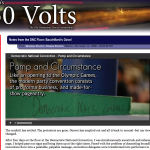 Originally written September 1st, 2008, after I returned from the Democratic National Convention in Denver, CO as a page for the Virginia delegation. (A screenshot of the original is at right.)
Originally written September 1st, 2008, after I returned from the Democratic National Convention in Denver, CO as a page for the Virginia delegation. (A screenshot of the original is at right.)
I was too young to run for Delegate from Virginia by a few months at the time, so I started badgering everyone I could at the Democratic Party of Virginia to appoint me one of Virginia’s 3 pages.
The gambit worked.
At 17, I sounded exactly as pretentious as the (unedited) post I wrote below.
The confetti has settled. The protesters are gone. Denver has emptied out and all is back to normal–but my view of politics has changed.
After four days on the floor at the Democratic National Convention, I was simultaneously awestruck and exhausted. As a delegation page, I helped pass out signs and bring them up at the right times. Faced with the problem of channeling boundless energy on the convention floor into a palatable, palpable message, convention delegates were transformed into performers in a show.
It was choreographed down to the line, which signs went up when. On the first three nights, a succession of signs followed a succession of speakers, all pieces of the pomp and circumstance that had taken over the modern political convention. “Securing America’s Future” and other slogans were plastered over thousands of signs, all the same Democratic blue, set in the ubiquitous Obama sans-serif font (Gotham, if you’re curious). To say message discipline was tight would be an understatement–message discipline was handled with as iron a fist as one could have in the Democratic Party. Clad in yellow, floor whips snaked through the aisles handing out messages which were to be broadcast en masse in tonight’s television and tomorrow’s photos.
Obviously it had been long since party convention served prominent business. Motions and roll calls, the parliamentary grease that keeps a convention moving, were merely pro forma, and even then, the presidential roll call vote became a show as Hillary Clinton moved that Obama be nominated by acclamation.
For anyone that’s been to Disneyland, the parallel between the modern political convention and Walt Disney’s land of enchantment become clear–except that everyone inside the Pepsi Center or Invesco Field served as a cast member, and you the voter served as the enchanted visitor. Inner workings of complex animatronics become obvious to anyone on the scene who is looking, but viewed through the eye of the visitor, a magical show becomes real. Brightly colored characters pop out at you, flashbulbs flicker, and at the end of your visit, there are fireworks. Modern life and modern politics has taken the raucous convention of yore and transformed it into a simulacrum, a vision of a convention that we perceive as real. In Simulacra and Simulation, Jean Baudrillard writes of four phases of the transformation from what is real to a vision:
It is the reflection of a basic reality. At three in the afternoon on Monday, the gavel came down and the Democratic convention began. Parliamentary procedure was still in play. The credentials committee and platform committee and resolution committee all went up in succession, and their reports were adopted. Despite the razzmatazz and flash, a few gavel bangs and motions reminded the crowd that there was still some business to be done. Of course, the whole point of the convention is to officially nominate a ticket for that year’s presidential election, which did indeed happen.
It masks and perverts a basic reality. It might have happened, but the nomination was a done deal far beforehand. Legally our campaign finance laws are under the pretension that the general election begins after the Convention and lasts all of weeks. Stripped of its official purpose, the Convention left its original moorings.
It masks the absence of a basic reality. Regardless of the completely settled nomination, on the third day the official roll call took place. I carried around the Virginia roll call sheet, passing it around to delegates who would vote for the nomination one last time, even though it was finished. At 3 PM, the scripted roll call began. State delegations gathered in the Pepsi Center as Alice Travis Germond, Convention Secretary rolled down the list of states. Virginia counted up 72 votes for Barack Obama of Illinois and 29 votes for Hillary Clinton of New York. One hour was allotted.
Fifteen minutes into the roll call, a light flashed at the desk underneath the Virginia sign signaling a call from the head office. Concerned that the staged roll call was going too quickly, delegates were urged to cheer louder and drag out the vote-casting process so that at the right time, Hillary Clinton would step out and move Obama’s nomination by acclimation at the end of the hour. Never had I been to a convention where roll call votes were being taken too slowly! But this was not just a convention.
Finally, it bears no relation to any reality whatever: it is its own pure simulacrum. Floor fights and 1968 became distant memories as the confetti rained down. The convention itself made no pretensions otherwise–it was a four-day romp, but more importantly, a four-day infomercial.
Baudrillard himself was sour on the concept, mourning the “hyperreal” that replaced reality in this modern, digital age. But once one casts aside the fact that this convention wasn’t really a convention at all in its most literal sense, what one saw might’ve been fake, but it was a hell of a lot of fun. All of this was staged for a reason, for the legions of Democrats who saw hope for America, born of the enthusiasm and energy that catapulted a boy from the South Side of Chicago onto the precipice of election to the highest office in the world.
The convention was a simulacrum because its purpose originally had been eliminated by the seeds of people-powered politics, by the primary system which supplanted the smoke-filled rooms that had decided on nominees by the past. The convention was choreographed by the campaign of Barack Obama, which without the zeal of millions of people who normally would not have a say–the primary chickens coming home to roost–a campaign which turned what was a haven for the insiders and lobbyists into a beacon of hope for all.
It might all have been a show, but all the world’s a stage.

